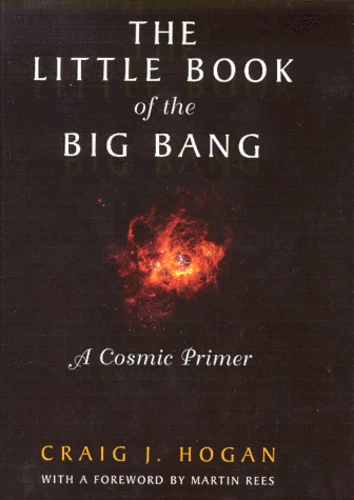THE LITTLE BOOK OF THE BIG BANG.. A cosmic primer
Par :Formats :
- Paiement en ligne :
- Livraison à domicile ou en point Mondial Relay indisponible
- Retrait Click and Collect en magasin gratuit
- Réservation en ligne avec paiement en magasin :
- Indisponible pour réserver et payer en magasin
- Nombre de pages181
- PrésentationRelié
- Poids0.32 kg
- Dimensions13,3 cm × 18,4 cm × 1,4 cm
- ISBN0-387-98385-6
- EAN9780387983851
- Date de parution10/06/1999
- ÉditeurSpringer
Résumé
Are you curious about cosmology ? When you hear about terms such as "inflationary universe," "cosmic background radiation," or "dark matter," do you find it hard to relate to them personally ? The study of the cosmos - the universe as a whole - is the science that most directly addresses ultimate questions : How did we get here ? How did it all begin ? What is the future of life, our planet, and the galaxy we live in ? The answers to all these questions lead ultimately back to the Big Bang, the beginning of all things. The Little Book of the Big Bang explains what modern cosmology is all about-simply, clearly, and with no technical expertise required. The more we learn, the more we realize that the universe is a very strange place. In The Little Book of the Big Bang, astrophysicist Craig Hogan reveals that : the oldest light we can see, the cosmic background radiation, looks just like the sun turned inside-out, with us on the inside ; the universe began as a small speck of energy nearly devoid of structure or information of any kind ; there is no "beginning" of time, but there is a point prior to which time becomes indistinguishable from space. The entire universe is in this small book : What happened at the beginning, how matter formed, how structure formed, what may happen to the universe in the future-and most important, how we know all this. This is the first book to read for anyone interested in the ultimate beginning.
Are you curious about cosmology ? When you hear about terms such as "inflationary universe," "cosmic background radiation," or "dark matter," do you find it hard to relate to them personally ? The study of the cosmos - the universe as a whole - is the science that most directly addresses ultimate questions : How did we get here ? How did it all begin ? What is the future of life, our planet, and the galaxy we live in ? The answers to all these questions lead ultimately back to the Big Bang, the beginning of all things. The Little Book of the Big Bang explains what modern cosmology is all about-simply, clearly, and with no technical expertise required. The more we learn, the more we realize that the universe is a very strange place. In The Little Book of the Big Bang, astrophysicist Craig Hogan reveals that : the oldest light we can see, the cosmic background radiation, looks just like the sun turned inside-out, with us on the inside ; the universe began as a small speck of energy nearly devoid of structure or information of any kind ; there is no "beginning" of time, but there is a point prior to which time becomes indistinguishable from space. The entire universe is in this small book : What happened at the beginning, how matter formed, how structure formed, what may happen to the universe in the future-and most important, how we know all this. This is the first book to read for anyone interested in the ultimate beginning.



